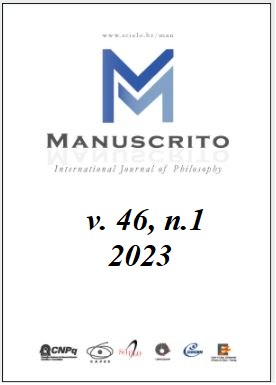Resumo
Uma corrente recente da epistemologia dá relevância especial à ignorância dentro da estrutura de uma teoria epistemológica. De fato, alguns querem dar um papel significativo à ignorância na teorização epistemológica. Neste artigo, argumentamos que um tipo específico de ignorância, que envolve o reconhecimento do fato de que se é ignorante, é fundamental para a aquisição de conhecimento, dada a estrutura epistêmica da sociedade. É claro, afirmamos, que Sócrates percebeu a relevância do que chamamos de "ignorância socrática" na aquisição de conhecimento e estava ciente da divisão do trabalho epistêmico e cognitivo que encontramos em nossa sociedade. Explicaremos a maneira como entendemos essa ignorância socrática, em oposição ao que chamaremos de "ignorância teimosa", e o papel que essa ignorância de conotações socráticas e traços de caráter relacionados pode desempenhar na aquisição de conhecimento de outras pessoas e com outras pessoas.
Referências
Alcoff, L. 2007. ‘Epistemologies of Ignorance: Three Types’ in Sullivan, S., Tauna, N. (eds.) Race and Epistemologies of Ignorance, pp.39-58.
Baehr, J. 2015. Cultivating Good Minds: A Philosophical and Practical Guide to Educating for Intellectual Virtues. (MS) http://intellectualvirtues.org/why-should-we-educate-for-intellectual-virtues-2-2/
Bett, R. 2011. ‘Socratic Ignorance’, in Morrison, D.R. (ed.) The Cambridge Companion to Socrates, Cambridge: Cambridge University Press, 215-236.
Brickhouse, T.C., Smith, N.D. 2000. The Philosophy of Socrates, Boulder, Colorado: Westview Press.
Brickhouse, T.C., Smith, N.D. 2010. Socratic Moral Psychology, Cambridge, CUP
Coady, D. 2012. What to Believe Now. Chicester, Wiley-Blackwell, 212p.
Croce, M. 2017. ‘Expert-oriented abilities vs. novice-oriented abilities: an alternative account of epistemic authority’, Episteme 1-23.
Davidson, D. 2001. ‘First Person Authority’, in D. Davidson, Subjective, Intersubjective, Objective. OUP, 2001, 3-14.
Davidson, D. 2005. ‘Dialectic and Dialogue’, in D. Davidson, Truth, Language, and History, Oxford: OUP, 2005, 251-259.
De Brasi, L. 2015. Reliability and Social Knowledge-Relevant Responsibility. Transformacao 38(1):187-212.
Dunning, D. 2022. ‘The Trouble of Not Knowing What You Do Not Know: Psychological, Philosophical, and Societal Implications’, in N. Ballantyne and D. Dunning, Reason, Bias, and Inquiry. OUP, 2022, 205-226.
Fisher, M.; Goddu, M.; Keil, F. 2015. Searching for Explanations: How the Internet Inflates Estimates of Internal Knowledge. Journal of Experimental Psychology 144(3):674-687
Gadamer, H.-G. 1999. Die Idee des Guten zwischen Plato und Aristoteles, in Gadamer, H.G., Gesammelte Werke 7. Griechische Philosophie III, Tübingen, J.C.B. Mohr (Paul Siebeck), 1999.
Giannantoni, G. 2005. Dialogo socratico e nascita della dialettica nella filosofia di Platone (edizione postuma a cura di B. Centrone) Napoli: Bibliopolis.
Gill, C. 2004. ‘Afterword: Dialectic and the Dialogue Form in late Plato’, in Christopher Gill, Mary M. MacCabe (eds.) 2004. Form and Argument in Late Plato, Oxford: Clarendon Press, 283-311.
Gill, C. 2007. ‘Form and outcome of arguments in Plato’s Gorgias’, in Michael Erler, Luc Brisson (eds.) Gorgias-Menon. Selected papers from the Seventh Symposium Platonicum, Sankt Augustin: Academia Verlag, 62-65.
Goldberg, S. 2011. The Division of Epistemic Labor. Episteme 8:112-125.
Goldman, A. 2001. Experts: Which Ones Should You Trust? Philosophy and Phenomenological Research 63(1):85-110.
Goldman, A.I, Olsson, E.J. ‘Reliabilism and the Value of Knowledge’, in Adrian Haddock, Alan Millar, & Duncan Pritchard (eds.) Epistemic Value, Oxford: Oxford University Press, 2009: 19-41.
Hoffrage, U. 2016. Overconfidence. In POHL, R. (ed.) Cognitive Illusions. London, Routledge.
Keil, F.; Stein, C.; Webb, L.; Billings, V.D.; Rozenblit, L. 2008. Discerning the Division of Cognitive Labor: An Emerging Understanding of How Knowledge Is Clustered in Other Minds. Cognitive Science 32(2):259-300.
Kidd, I. 2016. Educating for Intellectual Humility. In Baehr, J. (ed.) Intellectual Virtues and Education. London, Routledge . pp.54-70.
Kruger, J.; Dunning, D. 1999. Unskilled and Unaware of It: How Difficulties in Recognizing One’s Own Incompetence Lead to Inflated Self-Assessment. Journal of Personality and Social Psychology 77(6):1121-1134.
Le Morvan, P., Peels, R. ‘The Nature of Ignorance: Two Views’, in R. Peels, M. Blaauw (eds.) The Epistemic Dimensions of Ignorance, Cambridge: CUP, 2016, 12-32.
Lutz, D.; Keil, F. 2002. Early Understanding of the Division of Cognitive Labor. Child Development 73(4):1073-84.
McPartland, K. 2013. ‘Socratic Ignorance and Types of Knowledge’, in J. Bussanich & Nicholas D. Smith (eds.) The Bloomsbury Companion to Socrates, London-New Delhi-New York-Sydney: Bloomsbury, 94-135.
Medina, J. 2013. The Epistemology of Resistance. Oxford, OUP, 332p.
Mercier, H. 2017. Confirmation bias-myside bias. In Pohl, R. (ed.) Cognitive Illusions. London, Routledge
Mercier, H.; Sperber, D. 2017. The Enigma of Reason: A new theory of Human Understanding. London, Allen Lane.
Nottelmann, N. 2016. ‘The Varieties of Ignorance’ in R. Peels, M. Blaauw (eds.) The Epistemic Dimensions of Ignorance, Cambridge: Cambridge University Press , pp.33-56.
Oakes, H., Brienza, J., Elnakouri, A, and Grossmann, I. 2019. ‘Wise Reasoning: Converging Evidence for the Psychology of Sound Judgement’, in R. Sternberg and J. Gluck, The Cambridge Handbook of Wisdom. CUP, 2019, 202-225.
Peels, R., Blaauw, M. ‘Introduction’, in R. Peels, M. Blaauw (eds.) The Epistemic Dimensions of Ignorance, Cambridge: Cambridge University Press , 2016: 1-11.
Penner, T., Rowe, C. 2015. Plato’s Lysis, Cambridge, Cambridge University Press.
Pritchard, D. 2015. Epistemic Dependence. Philosophical Perspectives 29:305-324
Pritchard, D. ‘Ignorance and Epistemic Value’, in R. Peels, M. Blaauw (eds.) The Epistemic Dimensions of Ignorance, Cambridge: Cambridge University Press , 2016, 132-143.
Roberts, R.; Wood, J. 2007. Intellectual Virtues. Oxford, OUP , 340p.
Ryan, S. 2012. ‘Wisdom, Knowledge and Rationality’. Acta Analytica 27, 99-112.
Simon, J. 2015. Distributed Epistemic Responsibility in a Hyperconnected Era. In: L. Floridi (ed.), The Online Manifesto. Dordrecht, Springer, p.145-160.
Siegel, H. 2017. Education´s Epistemology: Rationality, Diversity and Critical Thinking. Oxford, OUP , 296p.
Sloman, S.; Fernbach, P. 2017. The Knowledge Illusion: Why we never think alone. London, Macmillan, 296p.
Sullivan, S., Tauna, N. 2007. Race and Epistemologies of Ignorance. Albany, SUNY Press, 276p.
Townley, C. 2011. A Defense of Ignorance. Lanham, Lexington, 152p.
Wagenknecht, S. 2017. A Social Epistemology of Research Groups. Dordrecht, Springer , 187p.
Williams, B. 2002. Truth and Truthfulness. Princeton, Princeton University Press, 344p.
Zagzebski, L. 2012. Epistemic Authority: A Theory of Trust, Authority, and Autonomy in Belief. New York, OUP, 304p.

Este trabalho está licenciado sob uma licença Creative Commons Attribution-NonCommercial 4.0 International License.
Copyright (c) 2023 Manuscrito: Revista Internacional de Filosofia


